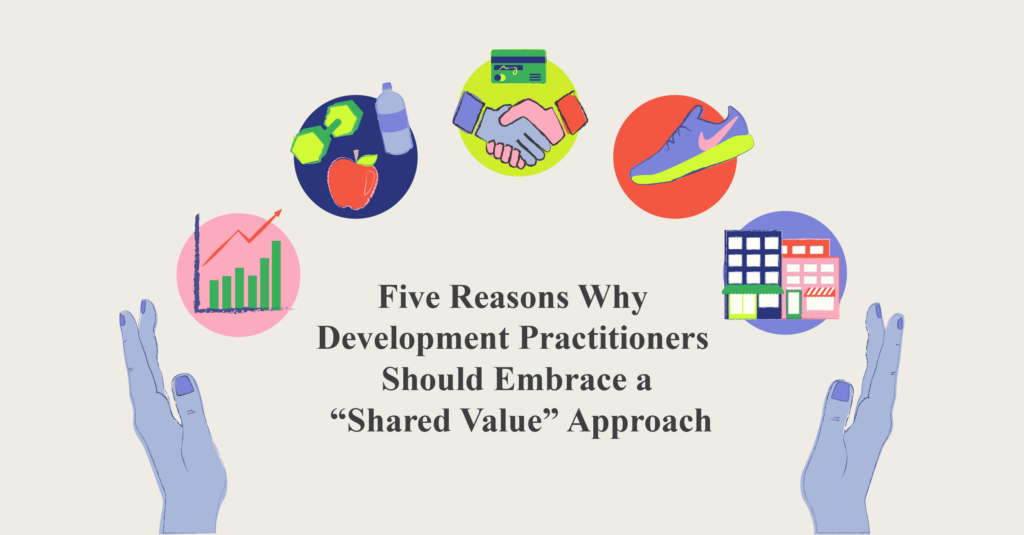<< Back to Media
Five Reasons Why Development Practitioners Should Embrace a “Shared Value” Approach
July 2, 2020

For a decade, corporate giant Nestlé hid the fact it was profiting from its decision to make healthier products that are lower in fat, salt, and sugar. Not until 2018 did it publicly reveal the economic value of its socially conscious decision to its investors.
That’s because corporations and investors often misunderstand the valuable relationship between investment performance and social impact, argue Harvard Business School luminaries Michael Porter, George Serafeim, and Mark Kramer in their essay, “Where ESG Fails.”
Many companies operate on the faulty premise that the image of “doing the right thing” — irrespective of its material value — attracts more investors than the action’s impact on a financial bottom line, argue Porter et al.
Likewise, socially responsible investors evaluate companies based on their Environment, Social, and Governance (ESG) rankings or a Socially Responsible Investment score. Yet the authors point out these measurements have been developed without regard to company growth or profits and consequently fail to make the causal link between a company’s social impact and its bottom line.
“Much of the investment community,” say the economists, “still views social issues either as irrelevant to maximizing shareholder value or merely as a risk factor, not as an opportunity to drive alpha.”
The authors propose a new approach: a deliberate profit-driven social impact called “shared value” to advance socially responsible investing.
“Companies that successfully implement strategies to create shared value can deliver superior shareholder returns,” the authors report. Shared-value strategies create a “virtuous cycle” where intentional decisions to improve communities and the environment generate higher profits for shareholders to reinvest in a self-reinforcing loop.
What does this mean for development practitioners?
The shared-value approach for investors presented by Porter et al. makes a strong case for private-sector engagement in the international development arena. Just as securities analysts and corporations misunderstand the valuable relationship between social issues and maximizing profits, many in the development community cling to a related myth that private sector, profit-driven objectives run counter to development and humanitarian outcomes.
Below are five reasons why development practitioners should embrace market-based solutions with a shared-value approach to achieve greater development and humanitarian outcomes at scale:
1) Development is profitable — and that’s not a bad thing. The top performing Change the World companies listed in Fortune magazine from 2015 to 2017 did not have the highest ESG scores; instead, they intentionally tied the social and environmental causes they supported to their business strategy. As a result, they outperformed the MSCI World Stock Index by an average of 3.9 percent in the year following publication.
2) Corporate profits generate social benefits. Companies that create shared value can outperform their peers while delivering excellent returns to society and their shareholders. For example, South Africa-based life and health insurance company Discovery offered economic incentives for customers to engage in healthier behaviors. Studies by the RAND Corporation and Johns Hopkins University confirmed that Discovery’s incentives reduced healthcare costs, increased life expectancy, and generated superior profits tied directly to the social impact wedded to Discovery’s business model.
3) Market-based solutions offer greater financial inclusion. MasterCard made the Fortune Change the World list by creating new products and entering new markets through its innovative financial inclusion initiatives. MasterCard partnered with the South African government to distribute social benefits to 10 million people through its debit cards. By tying financial inclusion to its business strategy, Mastercard created and secured a competitive position for itself in the industry. They delivered a social benefit directly tied to increased shareholder returns.
4) Shared-value investing drives innovation. Driven by a social commitment to reduce waste, Nike developed a running shoe unlike any other, with a top knit from a single strand of material. The shoe produced zero waste, was less expensive to manufacture, was lighter, and was more breathable than other shoes, delivering superior customer performance and more than $1 billion in sales for Nike.
5) Enterprise-driven development expands opportunity for all. Increased private-sector engagement in the development field could rejuvenate the social purpose of investment. Rather than extracting short-term profit for the few at society’s long-term expense or investing via algorithm-driven strategies and trade on market movements as ends in themselves, a shared-value approach in the development field could reconnect the positive relationship between capital investment and the improvement of society. The future of international development is enterprise-drive. The creation of the U.S. International Development Finance Corporation (DFC) and the U.S. Agency for International Development’s Private Sector Engagement Policy are based on this premise, and international development finance institutions worldwide are also embracing more market-based solutions to development challenges.
“When a social need can be tackled with a profitable business model, the magic of capitalism is unleashed,” the Harvard economists conclude. “Answers to the many deeply rooted societal problems we face become self-sustaining and scalable. Actual solutions to society’s problems are in reach.”
At Washington Business Dynamics, our international team is helping the U.S. Agency for International Development (USAID) develop and implement its flagship Private Sector Engagement policy. WBD and its partners from Booz Allen Hamilton and Planet Partnerships manage the Private Sector Support Mechanism award and provide technical assistance, data analytics, communications, and training on private-sector engagement approaches to USAID headquarters and mission staff worldwide. Our team of experts helps to strengthen USAID’s ability to mobilize private capital and embrace market-oriented approaches as a more sustainable way to support USAID’s partner countries and achieve development and humanitarian outcomes at scale. This approach fosters resilient and self-sufficient communities and accelerates a country’s “Journey to Self Reliance” by financing its own development.
